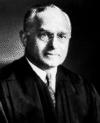- Frankfurter, Felix
-
born Nov. 15, 1882, Vienna, Austria-Hungarydied Feb. 22, 1965, Washington, D.C., U.S.Austrian-born U.S. jurist and public official.Immigrating to the U.S. at the age of 12, he was educated at the City College of New York and Harvard Law School, where he later taught (1914–39). He served as secretary of war (1911–13) under Pres. William H. Taft. He advised Woodrow Wilson at the Paris Peace Conference (1919) and counseled Franklin Roosevelt on New Deal legislation (1933–39). He promoted Zionism in the U.S. and helped found the American Civil Liberties Union; his friend Louis Brandeis secretly encouraged his attacks on the Sacco-Vanzetti conviction. In 1939 he was appointed by Roosevelt to the Supreme Court of the United States, on which he served until 1962. He became a leading exponent of judicial restraint, holding that judges should adhere closely to precedent and largely disregard their personal views; his opinions evince a concern with the integrity of government, sometimes at the expense of individual liberties.
 Felix Frankfurter.Library of Congress, Washington, D.C.
Felix Frankfurter.Library of Congress, Washington, D.C.* * *
▪ United States juristborn Nov. 15, 1882, Vienna, Austria-Hungarydied Feb. 22, 1965, Washington, D.C., U.S.associate justice of the United States Supreme Court (1939–62), a noted scholar and teacher of law, who was in his time the high court's leading exponent of the doctrine of judicial self-restraint. He held that judges should adhere closely to precedent, disregarding their own opinions, and decide only “whether legislators could in reason have enacted such a law.”Frankfurter was the son of a Jewish merchant who left Vienna for New York in 1893. Young Frankfurter was educated at the City College of New York and at the Harvard Law School, where he later taught (1914–39). He served as assistant to Henry L. Stimson when Stimson was U.S. attorney for the Southern District of New York (1906–09) and secretary of war under President William Howard Taft (1911–13). Frankfurter's influence on President Franklin D. Roosevelt was largely responsible for Stimson's return (1940) as head of the War Department during World War II.Frankfurter was a legal adviser to President Woodrow Wilson at the Paris Peace Conference (1919). During the immediate postwar period he was one of the most active American Zionists, and he helped to found the American Civil Liberties Union (1920). He delivered blistering attacks on the conviction of Nicola Sacco and Bartolomeo Vanzetti—in which he was encouraged by U.S. Supreme Court Justice Louis Brandeis (Brandeis, Louis) under a secret arrangement that was not revealed until 1982, when their correspondence was published. Brandeis, from his appointment in 1916 until 1939, when Frankfurter himself joined the court, corresponded frequently with Frankfurter, sending him a yearly stipend for legislative research and for such politico-social actions as the defense of Sacco and Vanzetti.When Franklin D. Roosevelt became president (1933), Frankfurter, who had advised him during his term as governor of New York, advised him on New Deal legislation and other matters. He was appointed by Roosevelt to the Supreme Court on Jan. 5, 1939. Concerned more with the integrity of government than with the victims of legal injustice, Frankfurter evinced toward federal and state legislative action a hands-off attitude similar to that of his friend Justice Oliver Wendell Holmes. His insistence on freedom of expression was partly offset by his disinclination to uphold the civil liberties of political radicals, especially members of the U.S. Communist Party during the “witch hunt” of the 1950s. In Sweezy v. New Hampshire (1957), however, he upheld a claim of academic freedom by a socialist college professor subjected to a state investigation.Frankfurter's belief that decent government depends in part on procedural safeguards for criminal suspects occasionally conflicted with his policy that the Supreme Court should defer to other branches of the federal government and to the states. In the criminal case of Wolf v. Colorado (1949), for example, he spoke for the court in condemning illegal seizure of evidence by state officials, but he ruled that the “due process of law” clause of the 14th Amendment (1868) to the U.S. Constitution did not require a state court to exclude evidence unlawfully obtained. (The Supreme Court repudiated this theory in 1961.) In his last major opinion, a 64-page dissent in Baker (Baker v. Carr) v. Carr (1962; the first of a series of legislative reapportionment cases in the 1960s), he unsuccessfully asserted that inequitable representation in legislatures is a “political controversy” not subject to the federal judicial power.Frankfurter retired in 1962. In July 1963 President John F. Kennedy awarded him the Medal of Freedom. Among his books are The Business of the Supreme Court (1927; with James Landis); Mr. Justice Holmes and the Supreme Court (1938); The Case of Sacco and Vanzetti (2nd ed., 1954); and Felix Frankfurter Reminisces (1960).Additional ReadingLiva Baker, Felix Frankfurter (1969), is a biography. Michael E. Parrish, Felix Frankfurter and His Times, vol. 1, The Reform Years (1982), surveys his career before his appointment to the Supreme Court. Helen Shirley Thomas, Felix Frankfurter: Scholar on the Bench (1960), analyzes his legal thinking. H.N. Hirsch, The Enigma of Felix Frankfurter (1981), is a psychobiographical reappraisal.* * *
Universalium. 2010.
